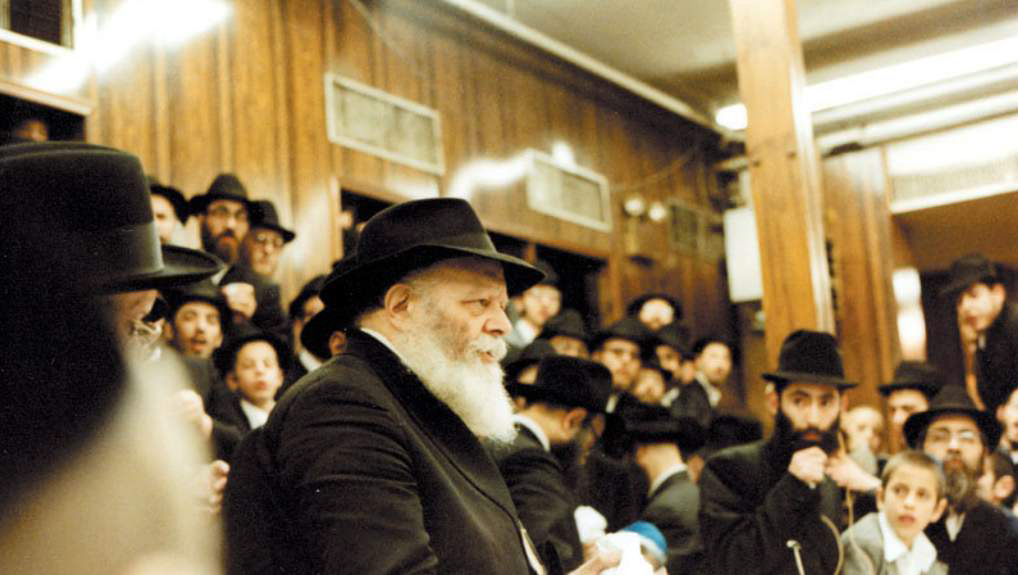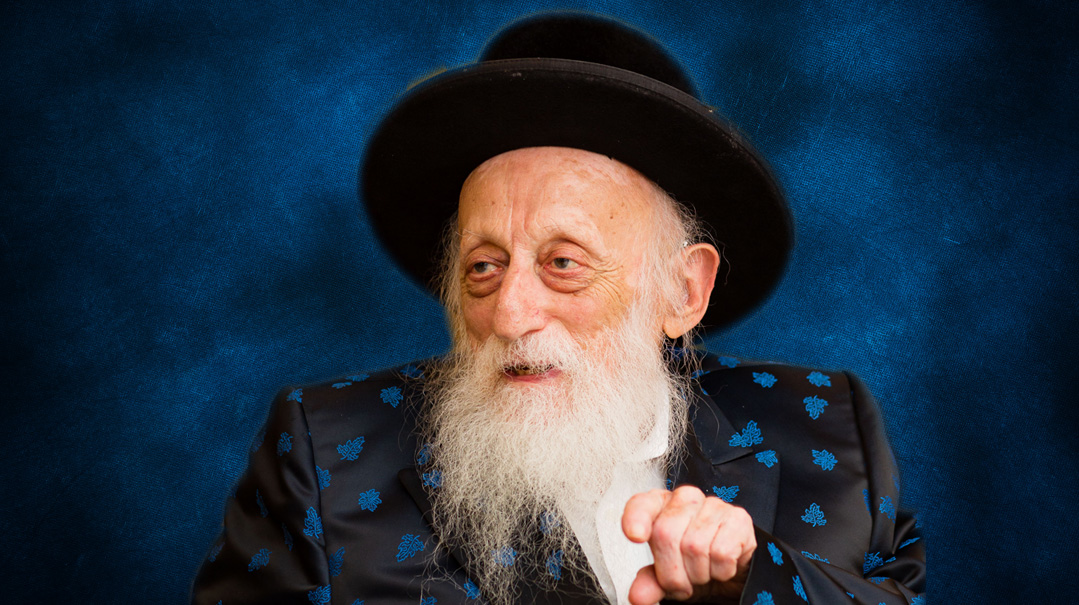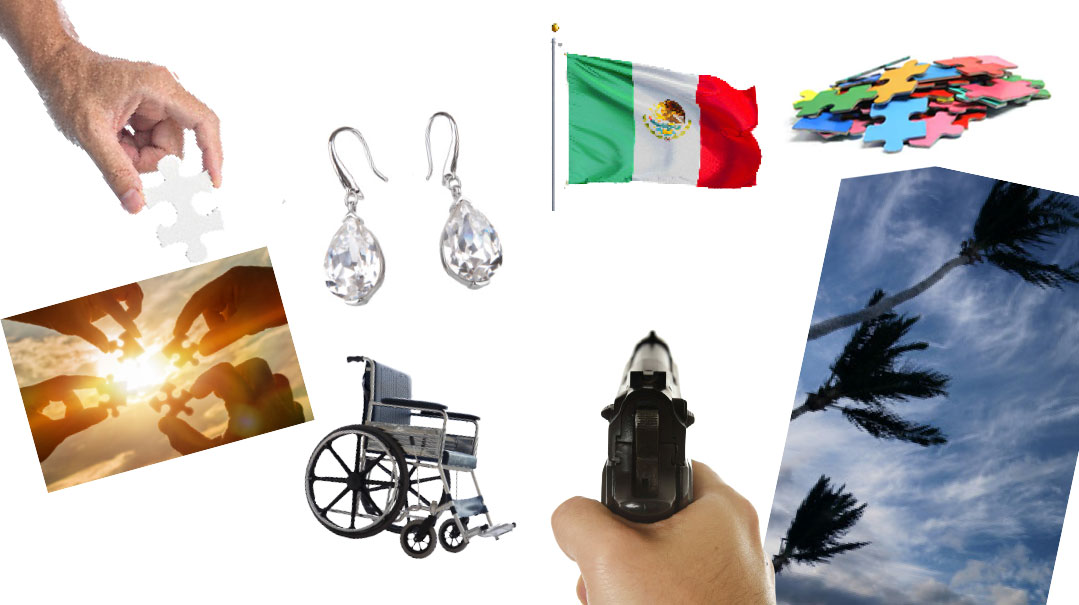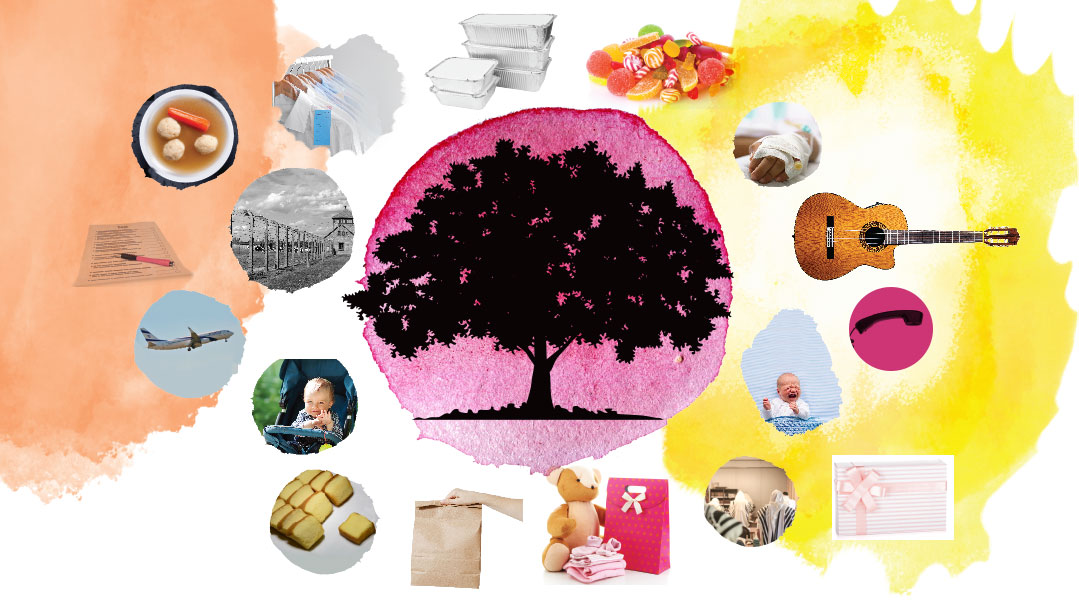My Greatest Gift


W hat’s the greatest gift you’ve ever received?
How about the most significant or meaningful?
As Shavuos nears and we prepare to celebrate the giving of our nation’s greatest gift of all time writers reflects on personal gifts that have changed their lives in a meaningful way.
Zeidy’s Flame
Rabbi Yitzchok Meir Gruen
Zeidy was a fighter.
I know little of his childhood in Krakow. He usually began his life story with the black day when the Nazis goose-stepped into town and his life was overturned. But I do know that in a world filled with tantalizing “isms,” in a city that had lost some of its best and brightest to foreign ideologies, Zeidy remained a heise Gerrer chassid, connected to his rebbe, heart and soul.
When the murderers swept through Poland, Zeidy stayed one step ahead of them. He was fearless, hiding tens of people, risking his life for others, because you did what was right. He joined the Russian partisans, saw miracles, survived.
He married Bubby, whose father he’d known in Krakow, and they immigrated to America. These new shores offered asylum, a safety blanket of sunshine, ice-cream trucks, endless opportunity — and the slippery slope of assimilation. But Zeidy didn’t budge. He never did don a shtreimel, but he transplanted the fire of Gur to his new home. He was instrumental in establishing a shul in his neighborhood; he sent his daughter to Bais Yaakov and his son to cheder. He found a job, gave tzedakah generously, quietly offered his help wherever it was needed.
When his heart began to fail, the doctors told him he needed a warmer climate with milder winters. It was Florida or Eretz Yisrael — hardly a question in Zeidy’s eyes. He moved to Eretz Yisrael when he was in his fifties. He could have retired, but Zeidy hated being idle. He found a new job, revamped the entire department he worked in, soldiered on. He was an integral part of the small shul two blocks from his house.
By the time I got to really know him, when I came to Eretz Yisrael as a bochur, Zeidy was old. Yet he was still a fighter. He’d insist on going to shul even when he felt terrible. We’d inch down the sidewalk, pausing frequently, sometimes resting on a bench along the way, but Zeidy davened with a minyan. He continued to quietly help others. Because you did what was right.
The years passed. And then, one Shabbos, he was gone. The levayah was late Motzaei Shabbos; he was buried in a cemetery not far from his home.
The next time I went to visit the small, two-bedroom apartment I’d been to so many times, it seemed hollow. Bubby was like a planet whose sun had vanished. We spoke about the grandchildren, and she fed me gefilte fish and cookies. And then she opened the breakfront and handed me Zeidy’s menorah. “For you,” she said simply.
I wish I could say it was a relic of his home back in Poland, that it was a menorah handed down through the generations. It wasn’t. The only things Zeidy managed to salvage from his home in Krakow were internal. This was a simple menorah he had purchased in Eretz Yisrael. Yet when I light it on Chanukah, I see the tiny flames flickering in the dark night, and think of a man who always kept the fire burning.
Gold Exchange
A. Asaraf
I twirled the gold ring between my fingertips, examining the unusual shape of the amethyst inset and the way it sparkled under the jewelry store’s bright lights.
We bought this at that winter sale in Gemini, I thought to myself. My shanah rishonah ring, probably the only time my husband and I entered a jewelry store together. It had been shortly after our wedding. We had come to trade in multiple gifts — Havdalah sets, matchbox holders, and cheap Kiddush cups — for one heavy Kiddush set that would forever grace our Shabbos table. With a good amount of change to spare, we had bought this gold ring.
Should I? Shouldn’t I? I sighed. It wasn’t much of a question. Placing the ring gently on the glass countertop, I tried to sound businesslike: “How much did you say…?”
I married a kollel guy. From the very get-go, gold and gemstones weren’t on my agenda. Where I grew up, though, these things were appreciated. Most of my relatives worked in the trade. Special occasions were marked with dainty leather boxes lined in silk, each containing something special. Throughout my childhood, I amassed quite a collection. All of it would prove invaluable as a kollel wife.
That’s not to say we didn’t get plenty from my husband’s family. It was my husband’s grandmother, in fact, who surprised us with a truly exquisite treasure on the birth of our first child: a prewar white-gold bracelet, prettily inlaid with diamonds and gemstones.
When the same grandmother traveled to Turkey a while later, she returned with a plastic bag from the Turkish bazaar that was quite literally filled with gold. “Everyone, choose!” she had said, dangling the bag gaily at a family party. I picked out a solid chain necklace that I wore happily for years with almost every outfit. Occasionally, additional pieces dropped into my jewelry box, each with its own colorful history.
All gifts. Like I said — we were kollel people. Gold wasn’t really on our grocery list.
But now, a great many of those pieces are gone. And no — we weren’t burgled.
Selling the antique bracelet was the decision I agonized over the most. I was concerned my husband’s grandmother would be upset. But she got sick and her mind, unfortunately, wandered.
Chanukah loomed and the only menorah in the house was a small tinny thing my husband had bought in yeshivah. I couldn’t imagine lighting up with that. So I took the bracelet to the jewelers on Ben Yehudah, and they sold it to a private collector. We bought a stunning silver menorah with that money, and every Chanukah, as the oil bursts to life, I see the brightness of that bracelet reflected in its flames.
I sold my gold watch when our oldest was two and our electricity was about to be cut off. Shortly after, when another utility bill was due, I parted with an amber pendant. My shanah rishonah ring went to pay for groceries the year my salary came in three months late and there was no one we could borrow from.
My husband did everything he could between sedorim to shore up our balance sheet — but one particularly tricky September, no matter how hard we stretched, we simply couldn’t cover the cost of school supplies and the looming Yamim Tovim. A lot of the gold from Grandma’s gift bag went then — along with every ounce of silver we could spare.
So many details are a blur in my mind. There were numerous times when the going got tough —but never tough enough to make my husband leave learning.
I said the details are a blur, and yet there are certain things that never fade. I’m shy by nature, so entering a store and offering jewelry for sale was never easy. And each item had a value beyond its price in gold or silver. There was a story behind each ring, bangle, and pendant.
Make no mistake, it wasn’t that I didn’t care for the gifts, or didn’t see why I should keep them.
It was just that there was something else we wanted more.
When we first met nearly 25 years ago, my husband had asked, lines creasing on his forehead wistfully: “How long, do you think, will I be able to stay in learning?”
I’d answered, without thinking much at all, “Two years… three, perhaps? Maybe a little longer? As long as we can!” I said this with wide-eyed enthusiasm, tempering it with a dash of reality: “I guess when things become impossible, you’ll go to work.”
I quickly realized, however, that for my husband, learning wasn’t a mere chore you ticked off your list, it was the very oxygen that helped him breathe throughout the day. With stakes that high, his learning soon meant just as much to me. And somehow, the impossible never seemed possible.
And that’s the greatest gift of all, the gift of courage that Hashem gave us when we had none; the perseverance despite irrational odds; and above all else, the way my husband loves to spin each blatt Gemara into gold.
Ever Grateful
Rabbi Yaakov Rosenblatt
Three decades ago, I was an intense, critical, introverted, truth-seeking adolescent. In other words, a typical teenager.
For seven years, I walked along the uneven path from childhood to adulthood, measuring and internalizing the strengths, weaknesses, idiosyncrasies, and characteristics that would become “me.” To say that I can put myself back into the teenage mindset would be a stretch. But I do remember some of the thoughts and attitudes I had at the time. And in quiet moments, I wonder which teenage experiences had the most impact on me, and which steered me to become the man I am today.
The most important event I can recall is the gift I received when I was 15. I view it, simply, as a gift from G-d. It was the entrance into my life of a person, someone who would change me forever.
Life is turbulent for every teenager, and it was no different for me. I had ups and downs, highs and lows. Sometimes, I thought the future was grand. But more of the time, I was obsessed with the challenges G-d had given me, and cognizant that I was not brilliant, had not a sharp tongue, was less than average in charisma, sports, and most items that carry teenage currency.
Though I realized that perfection wasn’t within me, perhaps, I thought, it was in the rebbeim and role models around me. But in my teenage mindset, at least at times, I focused on the flaws of the people around me and concluded that my peers weren’t serious, and my teachers weren’t flawless. For instance, it bothered me greatly that the teachers gave more time to the top students and charismatic personalities. Looking back today, my perceptions were suspect. But at the time, I remember believing what I thought strongly.
What does a teen struggling with his own imperfections and the perceived shortcomings of his role models do? What does a teen of spiritual bent who can’t find the perfection he craves within the koslei hayeshivah do? Ultimately, he looks for it elsewhere. Or he concludes that perfection doesn’t exist and it’s futile to pursue it.
That’s when G-d gave me the gift. He gave me “the Mashgiach.” The Mashgiach was visiting from Eretz Yisrael; he had family in the area. He spent a few weeks at my yeshivah. Each morning I went to his shiur in Nefesh HaChaim. Some of my friends didn’t find him charismatic; I was taken by his authenticity. Some didn’t appreciate his message; I reveled in his purity. He was a true baal mussar. His every action was measured. His every thought was structured. He controlled his emotions flawlessly. He was never angry, always thoughtful, and very perceptive. He was entirely consistent and essentially G-d-fearing. He was the role model I needed.
Shortly thereafter, he left the yeshivah and went back to Eretz Yisrael. When I look back on it, I realize that had the Mashgiach remained at the yeshivah, I would have inevitably found a perceived imperfection. Perhaps he would have criticized me. Perhaps I would have seen something that seemed incongruous in his message. The mind of a 15-year-old is imperfect and hardly rational. It sees black and white; I was taken by the white of his light.
The gift I received was a vision of greatness. It carried me forward. It allowed me to believe and connect to Hashem as I struggled to find myself, my place, and a reverence for people greater than me. It let me believe in others, and let me believe in what man could achieve. I may not have been an academic star or the most popular kid in class, but the Mashgiach showed me that I could do something great with my life.
Today, at 45 years of age, I know that perfection is G-d’s alone. Leaders lead within their human limitations. And I know that we are better off belonging to a group headed by inspired people than to focus on human imperfections and live a life apart. That is the lesson I came to as an adult. Only because G-d gave me the gift that carried me, inspired, through my teenage years.
For that I am ever grateful.
More than a Machzor
Gershon Burstyn
Each Erev Yom Tov, as shkiah draws near, I walk to my bookshelf in the living room, scan the various spines for a distinctive gold lettering, and begin my thrice-annual astonishment over my machzor.
Machzorim for “Pesah,” “Shavuoth,” and “Sukkoth” to be exact, all edited by Paltiel (that would be “Phillip” in English) Birnbaum, and published by the Hebrew Publishing Company, New York.
They were a gift from my great-aunt Ida W., my grandmother’s sister, and the source of so many of my childhood memories.
Idaneni was an Auschwitz survivor, but she was also the greatest challah baker in the universe, the most talented interpreter of stuffed veal breast ever born, and the greatest concocter of cucumber salad man has ever seen. I am not exaggerating. Everything she cooked was divine.
It was my job, as a teenager, to drive her home after an afternoon at our house, where she would invariably chat with my mom as they conjured up some Hungarian delicacy. The foolishness of youth, they say. Sitting in my house was a treasure and I would never have known it.
I can’t remember a single conversation from our time in the car together. But I do remember a kind of sullen silence. She survived the lager because she could speak German. A first husband was killed, she remarried, and then came a son and the Hungarian Revolution. By the time I knew her, she lived in a tidy, modest apartment in the United States, where crochet covered the sofas and the hallways smelled like weathered varnish.
She gave me the machzorim for my bar mitzvah. But here’s the thing: there’s no reason she should have given them to me. There was no chance I was ever going to use them. Zilch, zero, nada, never, no way, no chance. Uh-uh. But she did.
She even had the cover embossed with my name: Gershon Burstyn. I go by that name now, but nobody called me Gershon at the time. Nobody. My grandfather, who I was named after, was Gershon Burstyn. But that’s all the name was, a memory.
The gadlus. What did she know that I didn’t? How could she have known? There wasn’t much to recommend me at the time — and I’m not being modest. How could she ever think I would use them?
I guess she did. Or maybe her gift to me was this: Your name is Gershon Burstyn. These are machzorim we use on Yom Tov to serve HaKadosh Baruch Hu. Whether you ever use them or not, that fact remains. Know it and be wiser.
Or maybe it was: You aren’t who you think you are. I see your neshamah more clearly than you do. You will use these one day. Keep them safe.
Baruch Hashem, I use them. The nusach in Eretz Yisrael isn’t exactly the same as the Birnbaum, so I tend to use them only for Maariv. But each time I do, I think of Idaneni and the incredible, other-worldly gift she gave me. She saw something in me I couldn’t see myself. There is no end to my thanks. —
My Forever Sponsor
Rachel Ginsberg
Since her sudden passing the week before Pesach, Sorah Rosenblatt merited heartfelt eulogies in the various Jewish publications she worked for. She was a writer, poet, and editor, whose words touched the hearts of readers around the Jewish world. Wait… Sorah who? How ironic — because most people didn’t even know her real name.
You might recognize the names Ruth Lewis (author of a powerful and profound volume of poetry called Notes to Myself), Rivkah Glick (writer in Yated) and Tzipporah Wald, the name she used for her memorable stories published over the years in Mishpacha (“When Do I Bentch,” “Four Goblets,” “Cinnamon,” “The One Who Got Away,” “The Thing About Diamonds,” and many more). In fact, she was one of Mishpacha’s founding staffers, burning the midnight oil in the office during the magazine’s early days. Yet as author Sarah Shapiro so eloquently wrote, “Sorah Rosenblatt was a brilliant observer of life, and of death, but in person, she seemed humble to the point of invisibility.”
In her anonymity, she gave the gift of her poetry, her stories, and her editorial eagle eye to thousands of readers. But to me, and to dozens — perhaps hundreds — of other Jewish women, she gave the most precious gift: the gift of her time and her wisdom.
You see, Sorah wasn’t only an anonymous poet and writer. She was also an anonymous mentor. Dozens of women would speak to her for hours every day, and most of them didn’t even know her last name. She was simply Sorah, the person you called when you were in crisis, when your marriage was falling apart, when your children were headed down a slippery slope, when shidduchim were giving you a knock-out punch.
For the last 16 years, I spoke to Sorah almost daily — it was part of my “program,” a 12-step model for women, and Sorah was my sponsor. She taught me how to let Hashem into my life in a real way, how to relinquish control when it never helps anyway, how to improve my relationships and regain emotional intimacy.
But Sorah was like a phantom, attached to everyone but belonging to no one. While she knew almost everything about me, I understood early on that she never belonged to me — I had no exclusivity over her, because she, in fact, belonged to all the hundreds of women who sought her wisdom, many on a daily basis. She was able to get into everyone’s head and contain them all — from struggling young wives who didn’t yet know this new language, who still thought real-life ruchniyus was a hashkafah course in seminary, to those who’d suffered a life of hard-core trauma or abuse.
How could someone divide herself into so many pieces and yet stay so whole? I’ve often thought of Sorah as a horizontal bar with many vertical parallel strings attached across its length. I was at the end of one of those strings, able to draw down her gifts without interfering with any of the other strings.
Sorah kept her own life compartmentalized as well. There was the world she gave to others. But this Baltimore-born and American-educated woman came to Israel and married a Yerushalmi Breslover, raising a Yiddish-speaking family insulated from the foreign culture of the Diaspora; and even her own grown children were amazed — shocked, actually — as they kept hearing, after her passing, of her widespread popularity and influence.
With her sponge-front tichel, sensible Brill shoes, wire-framed glasses, and polyester blouses buttoned to the neck, she looked more the part of a Meah Shearim bubby than a woman of cosmopolitan wisdom. That was Sorah — she had the world at her fingertips but took nothing for herself. (When they added on a rental studio to their Jerusalem apartment, she — who, little did people know, happened to love interior design and Martha Stewart — designed a state-of-the-art kitchen for it, while her own cabinets hearkened to Israel’s Austerity days.)
Sorah taught me the Rebbe Nachman story of the Lost Princess, the lesson of our personal spiritual searching, struggles, and yearnings.
She taught me that “the road to abstinence gets narrower,” meaning that as you go through life and become more spiritually refined, you need much less of the outer stimulation we all think we’ll just wither away without.
Then the disease she thought she’d licked with chemo came back with a vengeance and attacked her brain. And when she could no longer give the gift of herself to others, Hashem quickly took her back.
Let’s try and keep this cheerful, Breindy told herself, as she always did when it was time for goodbyes. “Ki b’simchah teitzei’u, u’v’shalom tuvalun — If you go forth amid joy, you will dwell in peace.” How can we inject some humor to lighten up this situation? (From “The One Who Got Away”)
Goodbye, my forever sponsor. And thank you for the best gift ever — you.
(Originally featured in Mishpacha, Issue 662 – Special Shavuos Edition 2017)
Oops! We could not locate your form.












